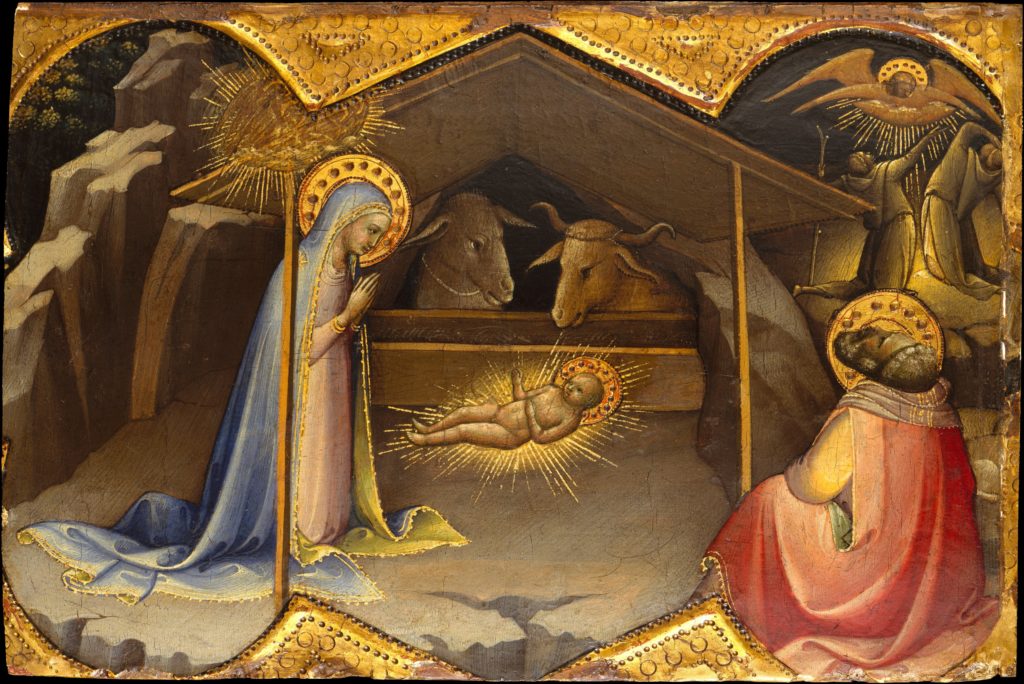The Blessed Virgin Mary gave birth to her Son “and laid him in a manger because there was no room for them” (Luke 2:7). How many emotions surge up in us when we read that verse? It may even trigger feelings of misery, anguish, and rejection that have hampered our own life.
Horrible words
A harrowing scene in the film “Schindler’s List” depicts a Jewish woman desperately dodging capture by the Nazis on Kristallnacht. She races to the ingenious hiding place of a prescient friend. But once there, the friend, now hysterical with fear, bars her from entering, sputtering the horrible words, “There is not enough room for you.” Then the hatch slams shut, leaving the hunted woman stranded in her peril.
Acknowledging a Presence
Fear makes us shut out people. And yet, what we ourselves dread more than anything else in life is being left utterly alone and abandoned — the punishment of solitary confinement. We crave a Presence in our life that can free us and embrace us. It is faith that enables us to respond to that need, for the essence of faith, according to Cardinal Joseph Ratzinger, is something that “meets me which is greater than anything we can think of for ourselves.” Faith is acknowledging a Presence that changes us.
A manger is the poorest of beds. Making room for Jesus in the manger of our heart begins by confronting the reality of our own poverty. “There’s something worse than being needy: it’s being alone with our self-sufficiency. Our needy heart is the principal instrument that has been given to us to recognize Jesus” (Father Julián Carrón). It’s our neediness, our poverty, even our panic that ultimately moves us to welcome Christ in … to surrender to this Presence that knocks at our door. “When I awake, nothing interests me but my desire for God’s Presence — this is poverty” (Servant of God Luigi Giussani).
A heroic Protestant pastor, Martin Niemöller, preached stunning sermons while imprisoned in the Dachau concentration camp. He says in a Christmas sermon:
“God, the eternally almighty God, enters into the most extreme human poverty imaginable. No person is so weak and helpless that God does not come to them in Jesus Christ, right in the midst of our human need; and no person is so forsaken and homeless in this world that God does not seek them in the midst of our human distress.”
Go and make room
It is the experience of our forsakenness and distress that convinces us of the lavishness of God’s mercy in singling us out. A heart transformed by the Presence of Jesus remains on the lookout for him in the suffering of others, ready to make room for him.
After my mother died in 2016, I discovered among her personal effects a newspaper clipping from the 1970s she had saved from our local paper. The title: “Life Tied To Mechanical Kidneys.” It’s about two hemodialysis patients who participated in the mechanical process of having their blood cleansed at the town’s hospital three times a week. The first patient mentioned was my father, who battled kidney disease for 10 years before he died at age 49 on Christmas Eve.
I didn’t know such a newspaper story even existed. It includes quotes from my father; one mentions how he would use his free time “organizing the unit’s patient self-help group.” That would be just like him.
To make room for Jesus in the manger of our heart means refusing to be ruled by rejection. Some months after my father died, my brother Tim told me an astonishing story about my father. Apparently on the hemodialysis unit worked a disagreeable orderly, deeply unhappy with life, who took out his displeasure on the people around him. He was surly and rude, going out of his way to make the patients’ already miserable lives even more so.
As Christmas approached, my father asked my brother Tim to take a ride with him. On the front seat of the car was a Christmas present with a gift tag bearing a name my brother didn’t recognize. It was this orderly’s. My father had found out where the young man lived, and had decided to personally deliver a gift to him. I don’t know what that Christmas present was, but this is what it meant: No matter how you may treat me, I want you in my life. And I want the love of the One who has come into my life to change your life as well. I want to give you his love. There is enough room for you here.
We want to make room for Jesus in the manger of our heart, not just at Christmas, but all throughout the liturgical year. The night before he dies, Jesus directs his disciples to prepare the Passover supper for them all: a “man will show you an upstairs room. It is there you are to prepare” (Luke 22:12). A manger is a place for animals to feed; the Upper Room is the place of the Last Supper. This preparing of the Eucharist room symbolizes the whole work of our Christian life: to make ourselves ready to receive Jesus Christ.
We say with the French poet Patrice de La Tour du Pin:
Come back to me: in my heart there is room for two…
Who speaks this, me or my God?
May it be my voice answering his!

